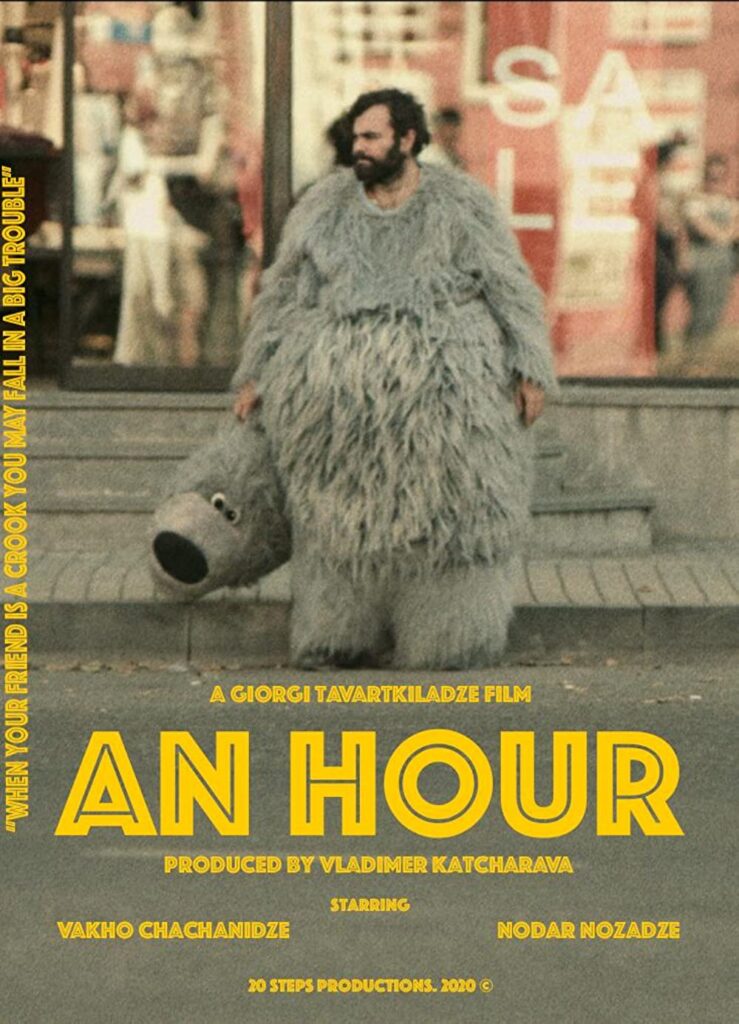It has been a long time since cinema stopped being a mass entertainment spectacle. It is a reflection of society now - sometimes propagandistic, sometimes harsh and sometimes fantastically bright, but it should clearly show the line between good and bad, white and black and even if it is a film about a negative character, the audience should not want to be in his place.
Cinema pays more and more attention to various problems of modernity. The short film "One Hour" (2020) by Giorgi Tavartkiladze, a young director, addresses one of these problems. It tells the story of one hour break of one day with an extraordinary continuation. Dito, an honest young man who is out to to eat during a break meets an unusual friend, Buta, thanks to whom he finds himself in a firestorm of scams, lies and debtors. A situation familiar to many is told at a fast pace and light humor.
Buta invites his long-lost friend to eat out, and this is where an interesting hour in Dito's life begins. He still has no idea that along with great stress, he will be left not only without money but also without his clothes in an hour.
This comedy cannot be called something unusual, but it is quite good fun to watch. The theme, in principle, is banal, familiar to almost everyone and nothing different, although the situation is described much more originally than in similar films. The story of fraud is well handled not only in Georgian cinema, but also around the world, however, the director describes this problem in a modern way, which brings the film closer to the audience - they seem to be watching the events unfolding around them from the screen.
The author tries to help a person to realize the true reality and return his lost feelings. The director is not always obliged to ask questions or give answers. Sometimes it is relevant only because he manages to create the appropriate intonation of the time, manner or style. Time needs an adequate language. A good dynamic is taken from the beginning, the plot is not boring. The camera, as the rhythm of modern life, quickly follows the adventures of the characters. From the first frames of the film, the viewer immediately realizes that he is witnessing a fraud.
Vakho Chachanidze's hero (Buta) stands out for his wisdom, he has a certain charisma and an instinct of self-preservation. He is so mastered in fake deeds that the events unfolding in the film are ordinary stories for him. He is ready for anything, he always carries chewing gum with him to relieve stress, not mentioning anything else, he scolds his friend for throwing away the gum: "Don't do that again, or the birds will peck it, die, and then there will be a lot of trouble." The actor brings the character to life so naturally that you get the impression that the problem might have been in his or at least his close friends’ circle. He is actually a good actor, there is no doubt about his acting. Unlike him, Dito (Nodar Nozadze) is not so bold and it is easy for the audience to notice his confusion.
There are well-known actors in the debtors’ roles too: Misha Gomiashvili, Eka Mzhavanadze, Gigi Dedalamazishvili, Gia Gabritchidze... Misha Gomiashvili's acting is memorable and eye-catching even from a small episode. He is not only Buta’s debtor, but the collective image of all debtors is united in him.
Representation of a social problem in cinema is not always unambiguous. Filmmakers have the right to make up their own minds, and the choices they make can have a significant impact on audience’s perception. For example, films that perpetuate stereotypes or show a one-dimensional representation of a particular group can have a negative effect on the viewer's perception. On the other hand, films that present a more sophisticated and complex view of a particular issue can lead to a deeper understanding and appreciation of that issue. With this short film, the director was able to show what a person really should be. From the two extremes, on the one hand, Dito, who is too honest, can't even take his shirt from his swindler friend, and on the other hand, the fraudster Buta, who will do anything.
The film is not made to show role models, it portrays the reality that along with the positive, there are l negative experiences, which the creative team of the film brings to light.
The film is shot in bright colors, which evokes a feeling of joy and optimism. The audience perceives events and characters positively. The lighting and sound are interestingly chosen to create a specific mood and general atmosphere. The original title of the film was supposed to be "The Break." Perhaps, it would have been better to leave it as the final version, since it would be more telling and interesting than "One Hour."
Giorgi Tavartkiladze's film is about the reality that is the daily life of many people, although no one thinks about it and the director makes us think about this issue seriously, through humor and light dialogues.
Teona Vekua






